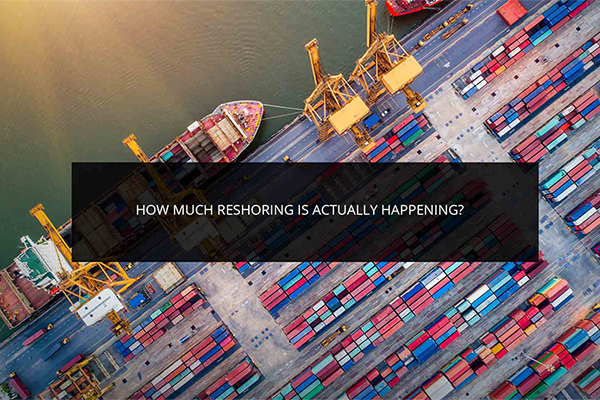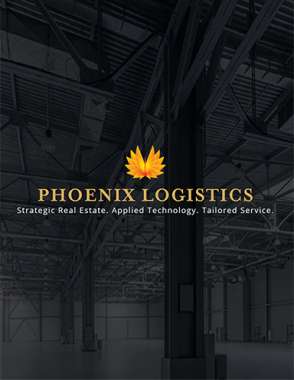How Much Reshoring is Actually Happening?

Reshoring is a complex and expensive proposition, and it has been difficult for reshoring proponents to maintain consistent progress in their efforts to bring manufacturing assets back to American shores.
Reshoring
Reshoring had an uptick in 2018-19 but then went negative again in 2020-21, according to Kearney’s Reshoring Index.
Reshoring is a complex and expensive proposition, and it has been difficult for reshoring proponents to maintain consistent progress in their efforts to bring manufacturing assets back to American shores.
However, we must also consider that we’re well into our third year of pandemic-related supply chain disruptions. The latest predictions say the supply chain will remain volatile through 2023 - or longer.
Will 2022 Be Reshoring’s Year?
Improving the resiliency and stability of U.S. supply chains will ultimately require a stronger domestic production capacity. With this in mind, it’s not surprising that 92% of executives surveyed in 2021 expressed positive sentiments toward reshoring in Kearney’s report or that 79% of executives who have manufacturing operations in China have already moved some operations to the U.S. or plan to do so within three years.
According to Reshoring Initiative, reshoring is expected to surge to a 38% increase in U.S. jobs generated through reshoring or foreign direct investment (FDI). The organization’s data also revealed a new annual reshoring record in 2021, with 1,800 companies reporting new reshoring and FDI efforts. However, experts from Reshoring Initiative also note that job numbers may be somewhat deflated. Many companies moving manufacturing assets from China choose to incorporate automation technologies into the U.S. plant, reducing the number of jobs created on U.S. soil.
On that note, rising labor costs in the United States may give pause to some companies on the fence about reshoring in 2022, but that probably isn’t necessary. Though factory workers will be paid significantly more stateside than in low-cost labor countries, many businesses have found they can offset higher labor costs through automation, lower transportation costs, and shorter order lead times.
Efforts on the government side may further bolster reshoring efforts. For example, the U.S. Senate recently passed the U.S. Innovation and Competition Act, which would invest $250 billion in scientific innovation and help American businesses compete with China and other high-tech manufacturing countries. In addition, both houses of Congress passed the America COMPETES Act of 2022, which will move to the President’s desk after the two houses resolve differences in their respective bills. The America COMPETES Act would provide funding for domestic manufacturing. Reshoring was also a prominent topic in President Biden’s 2022 State of the Union Address.
Though it’s difficult to say whether U.S. companies and foreign investors will take advantage of these opportunities presented by the American government and the current market, the supportive environment for reshoring is certainly stronger than ever before.
Industrial Real Estate Shortage and Reshoring
One of the largest obstacles to reshoring in 2022 will be the industrial real estate shortage. Businesses returning production to the United States may find it challenging to locate an available factory. Industrial real estate can expect record absorption through 2023, according to data from the NAIOP. With e-commerce booming and retailers expanding safety stock to avoid disruption, manufacturers will compete with logistics tenants for viable production space.
However, manufacturers have one advantage over e-commerce fulfillment in the search for industrial space - manufacturers can afford to stray from the beaten path and lease or purchase space outside premium markets. Though industrial inventory is scarce in all parts of the United States, reshoring manufacturers may have more luck revitalizing disused industrial space in rural areas - well away from the in-demand population centers where large retail giants their warehouses.
For businesses exploring their reshoring options, meeting with industrial real estate brokers should be among the early discovery steps. Finding the right broker can make or break the search for factory space that can realize your reshoring efforts.
About Phoenix Investors
Founded by Frank P. Crivello in 1994, Phoenix Investors and its affiliates (collectively “Phoenix”) are a leader in the acquisition, development, renovation, and repositioning of industrial facilities throughout the United States. Utilizing a disciplined investment approach and successful partnerships with institutional capital sources, corporations, and public stakeholders, Phoenix has developed a proven track record of generating superior risk-adjusted returns, while providing cost-efficient lease rates for its growing portfolio of national tenants. Its efforts inspire and drive the transformation and reinvigoration of the economic engines in the communities it serves. Phoenix continues to be defined by thoughtful relationships, sophisticated investment tools, cost-efficient solutions, and a reputation for success.
Article Topics
Phoenix Logistics News & Resources
4 Best Practices for Online Order Fulfillment In 2023 Is Industrial Real Estate Recession-Proof? 9 Tips for Offsetting Rising Parcel Rates Tips for Retaining Your Peak Season Temp Labor The Great Decoupling and What It Means for Industrial Real Estate How Does the Inflation Reduction Act Impact Industrial Real Estate? Not in My Backyard: Warehouse Edition More Phoenix LogisticsLatest in Supply Chain
Microsoft Unveils New AI Innovations For Warehouses Let’s Spend Five Minutes Talking About ... Malaysia Baltimore Bridge Collapse: Impact on Freight Navigating TIm Cook Says Apple Plans to Increase Investments in Vietnam Amazon Logistics’ Growth Shakes Up Shipping Industry in 2023 Spotlight Startup: Cart.com is Reimagining Logistics Walmart and Swisslog Expand Partnership with New Texas Facility More Supply Chain













